A decade ago, the notion of having an entire team in charge of social media management may have seemed absurd, but things have definitely changed since then.
Nowadays, the complexity of social media marketing warrants the existence of a team, however small, to handle the various aspects of a brand’s social media presence, from strategy to content creation, video editing and performance reports.
With so many tasks involved, it’s often difficult for one social media manager to handle all these responsibilities alone.
Looking to build a social media team from the ground up? Keep reading to see what it takes – from setting goals and KPIs, to defining roles, tasks and necessary skills and choosing the right tools to create synergy within the team.
Table of contents
What does a social media team do?
Objectives & KPIs of a social media team
Social media team roles
People and departments working closely with the social media team
Essential skills for a social media team
In-house vs externalized social media teams
Tools for effective synergy within a social media team
What does a social media team do?
A social media team’s main purpose is to build, manage and grow a brand’s presence on social media. Ideally, the social team should be a well-oiled machine, working together to implement each and every technique and strategy available to them (e.g. influencer marketing, paid ads, etc) in order to reach business goals.
What a social media team does depends, largely, on its environment – whether they’re part of a company or an agency.
Most often they’re in charge of developing the social media strategy, creating content for all platforms, managing and growing the online community, gathering competitive intelligence, tracking performance and more – all with the ultimate goal to increase brand awareness and drive sales.
As a business grows, so do its needs—and this of course applies to the social media team as well. Managing a brand with 10k followers is vastly different from a brand with 100k followers, right? As the audience grows, so do the demands for more consistent content, better engagement, and more in-depth social media insights.
Sometimes, the social media team might just be a one-man/woman show, whereby one single person takes on multiple social media roles and responsibilities. As the brand gets bigger and more active, the social media “team of one” comes under a lot of pressure, especially when they’re lacking all the tools and resources to do the job properly.
Objectives & KPIs of a social media team
How do you know when it’s time to hire someone to manage social media?
If you feel like your business growth has plateaued despite your best efforts, that you’re missing social media engagement opportunities left and right due to the lack of time and resources or that you don’t have a clear roadmap for your social media strategy… It's time to start investing in a group of professionals with social media expertise.
Assembling a solid in-house team can eliminate the need for hiring project-based social media consultants, and help you build a strong foundation for long-term social media presence.
Once you’ve got your social media team all mapped out, it’s time to think about objectives, aka what you expect the team to achieve and how that will impact the larger business goals.
When setting KPIs and goals for the social media team, it helps to take a step back, zoom out and look at the bigger picture.
While individual team members are focused on daily tasks like creating content or engaging with the online community, the team's focus should be on larger goals, like driving leads, boosting sales and increasing brand awareness – goals that must always align with the larger business objectives. Every move the social team makes should, therefore, strategically contribute to the company’s growth.
With that mind, let’s have a closer look at 5 objectives and KPIs the social team should prioritize and track.
Generate brand awareness
Social media is a fiercely competitive space, where every brand and creator fights for their share of the public’s attention. Generating brand awareness is therefore the key to reaching more people and growing brand recognition.
The social media team plays a crucial role in driving brand visibility, and they should explore every strategy available to them in order to reach this goal. Luckily, there’s no shortage of ways in which this can be achieved.
From crafting engaging, shareable content that resonates with the target audience to running social media campaigns and partnering with influencers who can introduce the brand to new followers, marketing teams have a wide range of powerful tools at their disposal.
For brands who want to pursue more than one way of doing social media marketing, paid advertising is another effective option. By balancing organic vs paid social media, they can reach a wider audience on platforms such as Instagram, Facebook, and TikTok.
The end goal is to build a solid social media presence and cohesive identity across all channels, and create valuable content that people naturally gravitate towards.
Drive sales
One of the main objectives of any marketing team is to ultimately drive sales for the company, though of course, they do so indirectly. By boosting brand awareness and generating leads, they create opportunities that, if nurtured properly, have a high chance to convert into sales.
Social media creates a unique space for marketers to connect with the audience in real time and gently influence their purchasing decisions.
By creating content that showcases product benefits, and using persuasive copywriting techniques, the social media management team can encourage users to take any desired action (visiting the website, signing up for a newsletter or even making a purchase).
Sharing UGC (user-generated content) can also provide powerful social proof, while constantly engaging with new and returning customers alike can lead to short-term sales and long-term customer loyalty.
Sales generation is one of those KPIs that frequently pops up in discussions with upper management, especially when it comes to social media ROI. While the social team doesn’t directly manage the entire sales process, their contributions are essential for achieving this goal.
Provide customer support
For brands that are active on social media, the social media team is often the first line of defense. They are in tune with the real-time thoughts, feelings, and conversations of their audience about the brand. Their insights, paired with a solid social listening strategy, can effectively enhance customer support as we know it.
The social team can also assist the in-house support team by setting up dedicated support channels, consistently engaging with the audience, and actively listening to their concerns and feedback. They can also try to mitigate potential crises before they escalate.
By dedicating time to nurture relationships with customers, the team can easily create a sense of community and make customers feel more comfortable reaching out for help or sharing their thoughts.
Build a brand community
Speaking of community-building, the social media team’s other main objective is to create a loyal community around a brand. This is made possible by cultivating a sense of belonging among the brand’s followers.
The social media marketing team is in a unique position to create a safe and inclusive space for meaningful interactions with the audience. Over time, this builds trust and strengthens connections. When people feel heard and valued, they naturally start to feel like they're part of the brand’s story.
Being highly responsive and human goes a long way when it comes to building a rapport with online followers.
To that end, the social media management team should prioritize responding to DMs as soon as possible, and communicate from a place of empathy and understanding. This way, people will feel encouraged to engage with the brand again and again.

Get competitive intelligence
One last key objective for the social team is to gather competitive intelligence. This implies keeping a close eye on competitors, learning from their strategies, and figuring out how to use these findings to improve the brand’s own approach.
Through competitive analysis, the team can gain a better understanding of where the brand stands within its niche or industry, and share these insights with other departments in an effort to align overall strategies across the company.
The ultimate goal is to learn from competitors’ mistakes, spot any gaps in their approach, and find opportunities to outperform them.
The most effective way to get competitive insights is to use a social media competitor analysis tool like Socialinsider, but this analytical detective work can be doubled by manually observing competitors’ social media activity. This might include keeping an eye on their audience interactions, seeing how promptly they respond to comments, what kind of language they’re using and so on.
Social media team roles
When we’re talking about the social media department structure, there’s one key thing to keep in mind: no two social media teams look the same. There’s no marketing department structure best practice per se. Digital marketing team roles and responsibilities are divided differently depending on the team’s size and the company itself.
Smaller teams tend to wear multiple hats, with each person juggling different tasks like content creation, community management, and analytics.
Larger teams, on the other hand, may accommodate more specialized roles, such as a content strategist, social media manager, community manager, and paid ads specialist.
So if you’re ever wondering what does a marketing team consist of, the short answer is: it depends largely on its environment.
With that in mind, let’s explore some of the most common roles and their corresponding social media marketing responsibilities.
Head of social media
Let’s start from the top and work our way down.
The head of social media is the one that makes sure the efforts of the social media team are perfectly aligned with the brand identity and objectives. They know the brand inside and out, better than anyone else on the team.
The head of social media is typically responsible for overseeing the entire social media operation, from strategy and creative concepts, from content creation to community and brand reputation management.
Some of their core responsibilities include:
- Outlining a data-driven social media strategy;
- Approving creative concepts that align with the overall social media branding;
- Managing the budget for social media campaigns;
- Setting and tracking all relevant team KPIs;
- Making sure the team are aware of and follow social media best practices;
- Reporting to senior management and showcasing the social media ROI;
- Communicating with key stakeholders;
- Keeping an eye on the latest industry and platform trends
This role is a blend of leadership, strategic thinking, and hands-on work, requiring a balance of both analytical and creative skills. The minimum experience required for this position is usually 3 to 5 years.
Social media strategist
Another key role in the social media creative department structure is that of the social media strategist. As the name suggests, this person is responsible for creating and guiding a brand’s social media strategy to meet the established social media goals.
Unlike the head of social media, whose focus is broader, the social media strategist is primarily focused on the day-to-day execution of strategies that align with the brand’s objectives.
Their main responsibilities include:
- Developing the social media strategy for every platform;
- Prioritizing top performing social channels;
- Defining content pillars for social media;
- Researching the audience and outlining social media personas;
- Doing market research;
- Monitoring trends to keep the brand relevant;
- Planning campaigns.
In teams where there is no head of social media, the social media strategist may step in and take on the leadership role. That means that, in addition to their usual responsibilities, strategists may also start managing budgets, coordinating with other departments and setting team-level KPIs. This requires a delicate balance between hands-on strategy planning and providing leadership and guidance to the team.
The minimum experience required for this role is usually 2 to 5 years.
Social media manager
When most people think about a social media team, the first role that comes to mind is that of the social media manager. That’s because, when companies first started hiring for social media positions, this was often the first position created.
Traditionally, the social media manager would, as the name itself implies, manage multiple social media channels, which meant creating social media content, developing the social media strategy and essentially handle any and all other tasks that the role called for.
Nowadays, as social media teams have expanded, social media managers can take on more specialized roles. In larger teams, this means focusing on specific skills, such as copywriting, and taking charge of the editorial planning process.
Keeping in mind that these vary greatly depending on the size and structure of each social team, here’s a look at some of the social media manager’s main responsibilities:
- Creating the editorial plan;
- Overseeing content creation and providing feedback;
- Ensuring a cohesive brand voice across all channels;
- Tracking social media metrics;
- Working with other departments to de-escalate any crises;
- Supervising junior team members and delegating tasks.
The minimum experience required for this role is usually around 1 year.
While I think the best social media teams involve a variety of specialists who are able to dedicate individualized skills to these areas, I think the best social media managers are those who understand enough about each of these skills to work most harmoniously among a specialized team. – Amy Peiffer, Social Media Lead
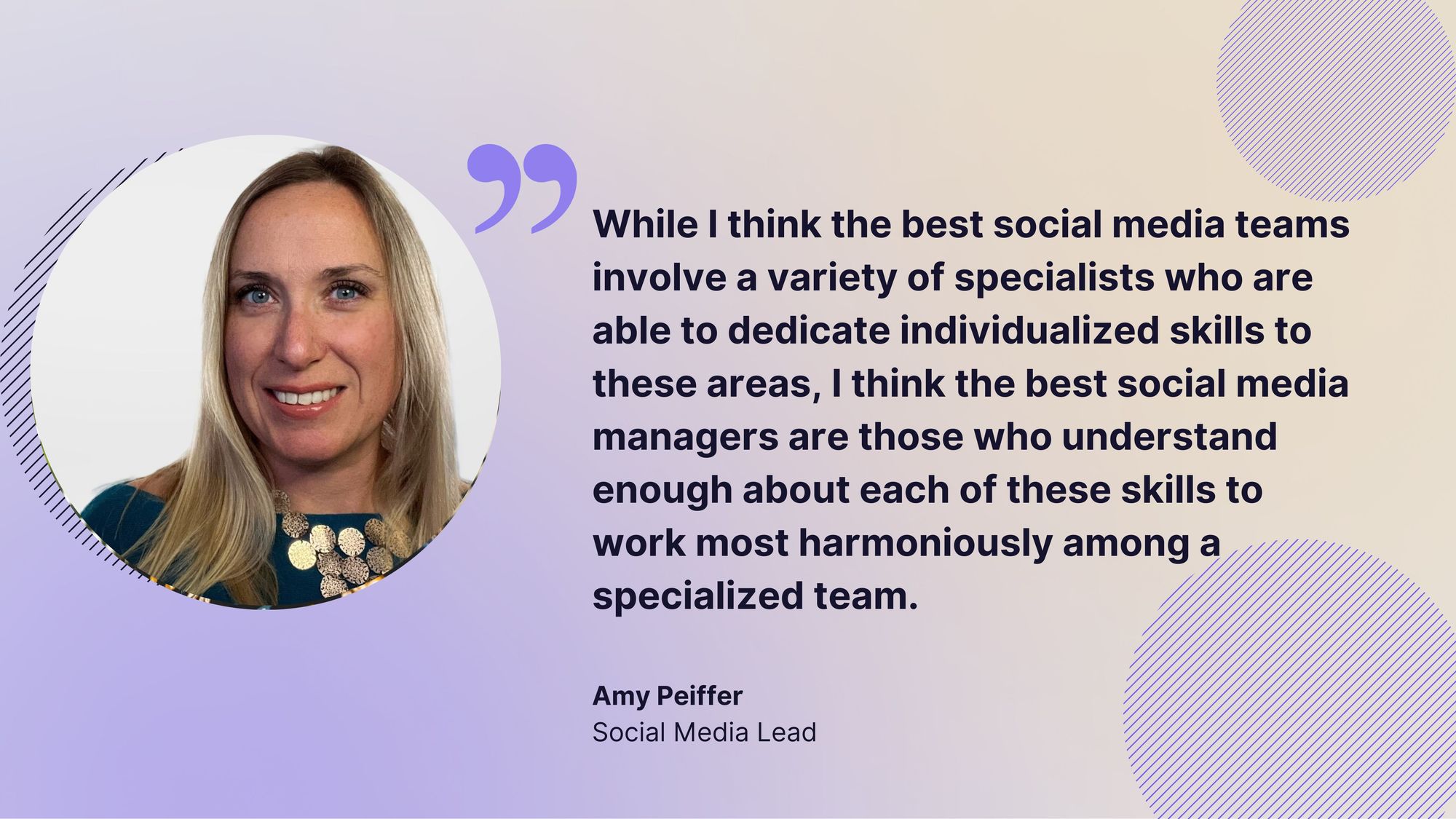
Content creator
Since content is the fuel that drives a brand’s social media presence, having one or more content creators on the team is crucial.
Ultimately, content creators are the ones that really know how to create content for social media in a way that drives engagement and makes people care about the brand.
The number of content creators depends on factors like the size of the company, how many platforms they’re active on, and their overall content strategy.
The person in charge of content creation can either be an in-house employee dedicated to crafting content full-time, or an external collaborator such as a freelancer, or even a project-based creator from a marketing agency.
Depending on the brands’ needs, content creators may specialize on a single platform, or produce content for multiple channels simultaneously.
Their tasks usually include:
- Writing copy for social media;
- Creating video content;
- Designing visuals for social media or collaborating with a design team;
- Following the social media content calendar;
- Making sure the content adheres to the branding guidelines/content briefs.
This role can be filled by someone with little to no experience, however, having some technical skills or certifications is highly encouraged.
Community manager
Community managers are often considered the bridge between a brand and its social media community. They serve as the voice of the brand, while also listening to and advocating for the interests of the people. Their goal is to build meaningful connections with followers in a way that helps the brand community grow and prosper.
Out of all the members of the social media team, the community manager is the most direct link to the audience, and the one responsible for creating an inclusive, welcoming space where followers feel comfortable sharing their thoughts and reaching out for support. By doing this, they help build trust and brand loyalty.
In a nutshell, the community manager is tasked with:
- Building and moderating online communities (such as Facebook or LinkedIn groups);
- Engaging with followers and initiating conversations when needed;
- Responding to both public and private messages (comments, DMs);
- Encouraging the creation and sharing of user-generated content (UGC);
- Organizing online events to boost social media engagement;
- Monitoring brand mentions and tracking user sentiment;
- Maintaining a consistent brand voice across all interactions.
The minimum experience required for this type of role is usually between 1 to 3 years.
Data analyst
Every social media team that aims to create a strategy based on real-time data – both on their performance and their competitors – needs a skilled data analyst. This expert dives deep into KPIs and social media benchmarks and spends time analyzing trends. They make sure to find the most useful tools to help the team understand the digital landscape and improve results.
A data analyst's work doesn’t stop at collecting raw data; they interpret patterns, identify opportunities, and suggest actionable insights to refine current content strategies.
With that being said, these are some of the key responsibilities of the social media data analyst:
- Tracking key performance metrics in a centralized social media dashboard;
- Gathering audience insights;
- Analyze competitive performance to uncover new growth opportunities;
- Spotting patterns in the brand performance evolution;
- Reporting to the social media strategist and head of social media.
Paid social specialist
When a social media team decides to branch out into paid advertising, they typically bring in a paid social specialist to manage this aspect. This person focuses on creating, optimizing, and tracking paid campaigns across multiple social platforms, making sure that the social media ROI remains high.
Paid social specialists are usually responsible for:
- Developing ad strategies that align with the brand’s social media goals;
- Employing best practices to create targeted ads;
- Managing the advertising budget to optimize spending;
- Monitoring the performance of ads and adjusting them to improve results;
- Reporting on paid campaigns performance.
Their expertise enables the social media team to tap into the power of paid ads, expanding social media reach and brand awareness in a way that complements the organic social efforts.
For this role, an experience of at least 1-3 years is usually needed.
Influencer marketing specialist
Finally, the influencer marketing specialist is the team’s go-to expert for anything related to influencer marketing. This role typically involves researching potential influencer collaborations (influencer scouting), identifying the right fit for the brand, and recommending partnerships for campaign collaborations.
Also, this person is often the one to determine the most effective content formats for influencer campaigns—whether that’s TikTok vs Reels vs Shorts.
An influencer marketing specialist’s task list usually includes:
- Building and maintaining relationships with influencers
- Negotiating contracts and agreements for collaborations
- Coordinating influencer campaigns, from planning to execution
- Monitoring influencer content closely to make sure it aligns with the brand values
- Analyzing the performance of influencer campaigns
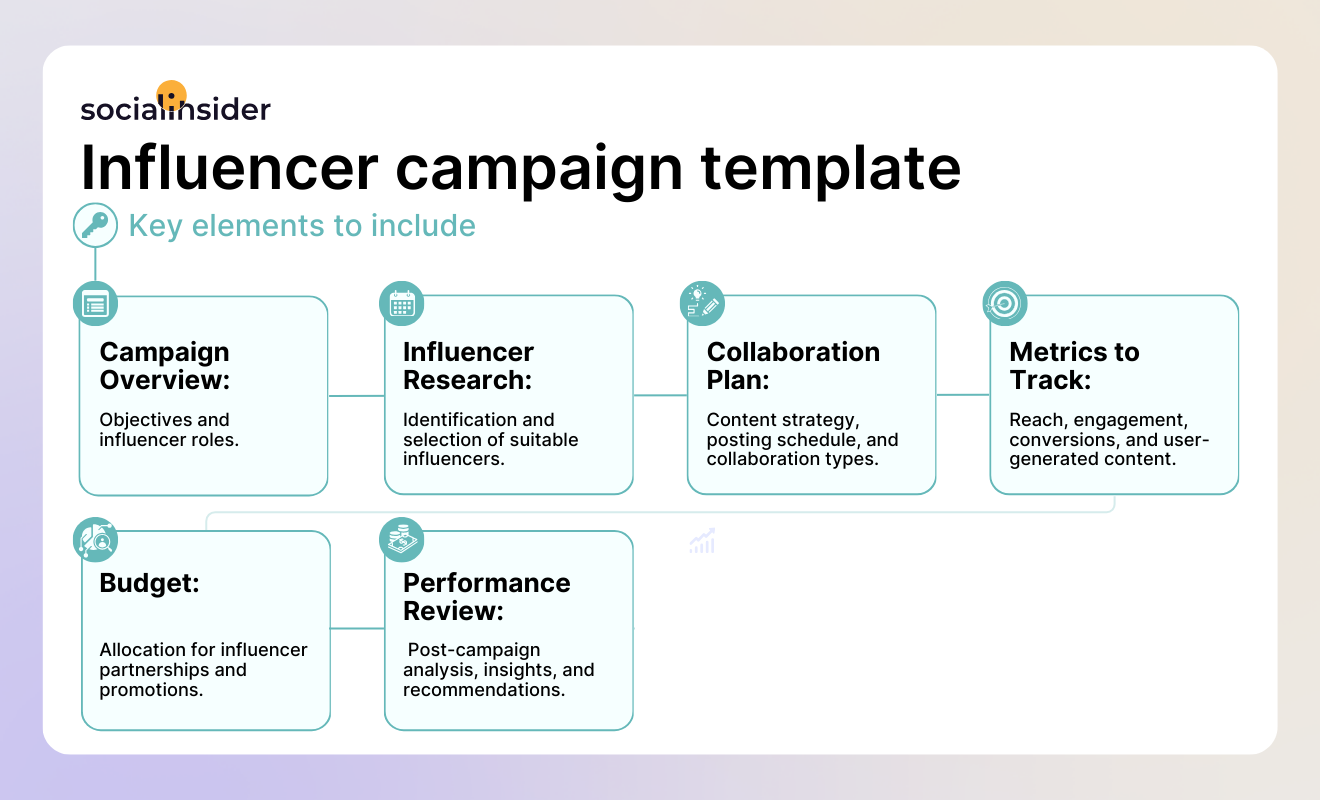
The influencer marketing specialist’s work is key in extending brand visibility and credibility with new audiences.
Usually, influencer specialists are expected to have at least 2-4 years of experience in social media to be considered for this role.
People and departments working closely with the social media team
Depending on how large the social media team is, and the complexity of their projects, there may be other people or departments that often collaborate with the team to make sure that the business goals are met.
By working together, these teams can pool their expertise and amplify the impact of their efforts.
Brand Manager
This is the so-called guardian of the brand’s voice. Their role is to ensure that all published content is consistent with the brand's identity, which means they can approve creative concepts and contribute with audience and market insights.
Fun fact: In some organizations, roles typically linked to the social media team, like the social media strategist or manager, may actually be found in the brand marketing team structure.
Copywriter
Some social media teams may opt to work with one of more external collaborators on copywriting-related tasks. These could range from writing descriptions for video content to creating copy for social media posts. By bringing in freelance or agency writers into content creation teams, businesses can explore fresh perspectives, and become more flexible.
Graphic designer
For brands that rely heavily on visual assets such as infographics, flow charts, stylized product screenshots and even memes, collaborating with a graphic design expert is a must. Given the importance of visual creatives on social media, consultation with experts in the marketing department is highly recommended.
Video editor
Likewise, if a brand prioritizes video content and has a solid video marketing strategy, then working with a professional video editor, whether in house or outsource, is very common.
Customer care department
When the customer care team and the social media team join forces, great things can happen. The social media team can identify customer issues in real-time, while the customer care department steps in to resolve them. As a result of this collaboration, both teams can exchange insights which can lead to improved products, services, and communication strategies.
Legal department
To make perfectly sure that everything that gets shared on social media adheres to the legal guidelines, the social media team benefits from having a direct line of communication with the legal department at all times. This helps the team prevent any copyright violations, misleading claims, or privacy issues.
Essential skills for a social media team
For a social media team to function like a well-oiled machine, certain key skills are needed. When most, if not all, team members possess these skills, they can collaborate more effectively, produce quality content consistently, and keep up with the fast-paced world of social media.
Let’s have a look at some of the most important skills for a social media team.
Good communication skills
There’s no wonder why every marketing job ad out there lists ‘good communication skills’ as a key requirement – without clear communication, nothing gets done properly. This goes both for internal and external communication (e.g. influencers or other project-based collaborations).
While social media needs a variety of skills, communication is 1,000% the most important in my opinion. Not only do you need strong written communication (as tone and emotion is often missed through text), you need strong verbal communication. - Julie Cappiello, Founder and CEO Pyxis Digital.
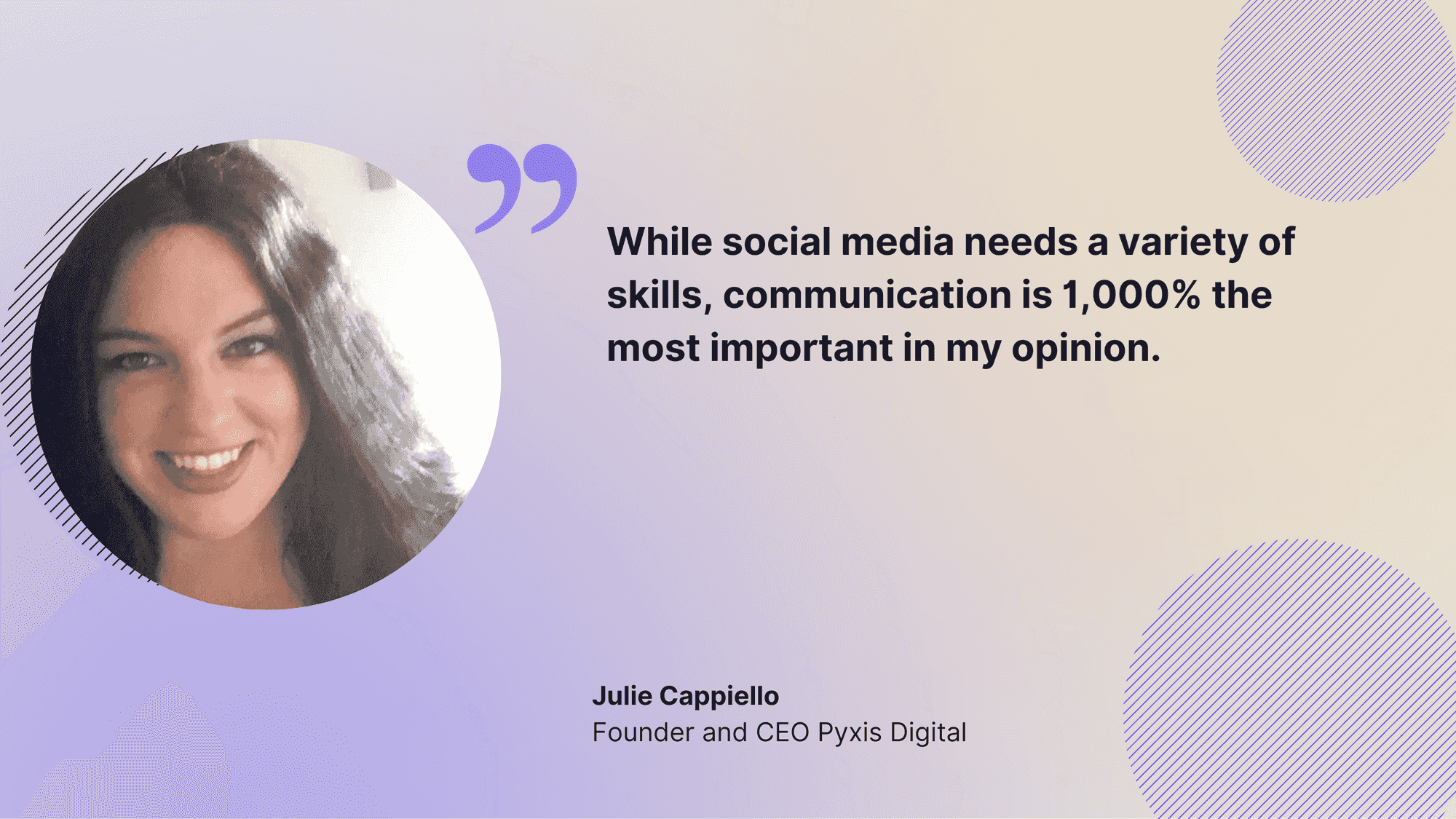
As the head of social media, you need to be able to clearly communicate with your team while delegating tasks, setting objects and offering guidance. As a content creator, you must be able to properly convey your message through text, otherwise the audience will miss your point and fail to engage with your content.
Community managers need strong communication skills to engage with followers and build meaningful relationships. Likewise, social media strategists must be skilled communicators in order to present data and insights to other departments in a way that’s both clear and easy to understand.
The bottom line is that, in every role within a social media team, communication is the foundation for success.
Strong communication skills are absolutely essential, not just for writing engaging content but also for interacting with followers, colleagues, and stakeholders. Clear communication helps ensure the brand’s message is consistently conveyed. - Courtney (Lane Maki) Larvadain, Account Supervisor, Social Media the JRT agency
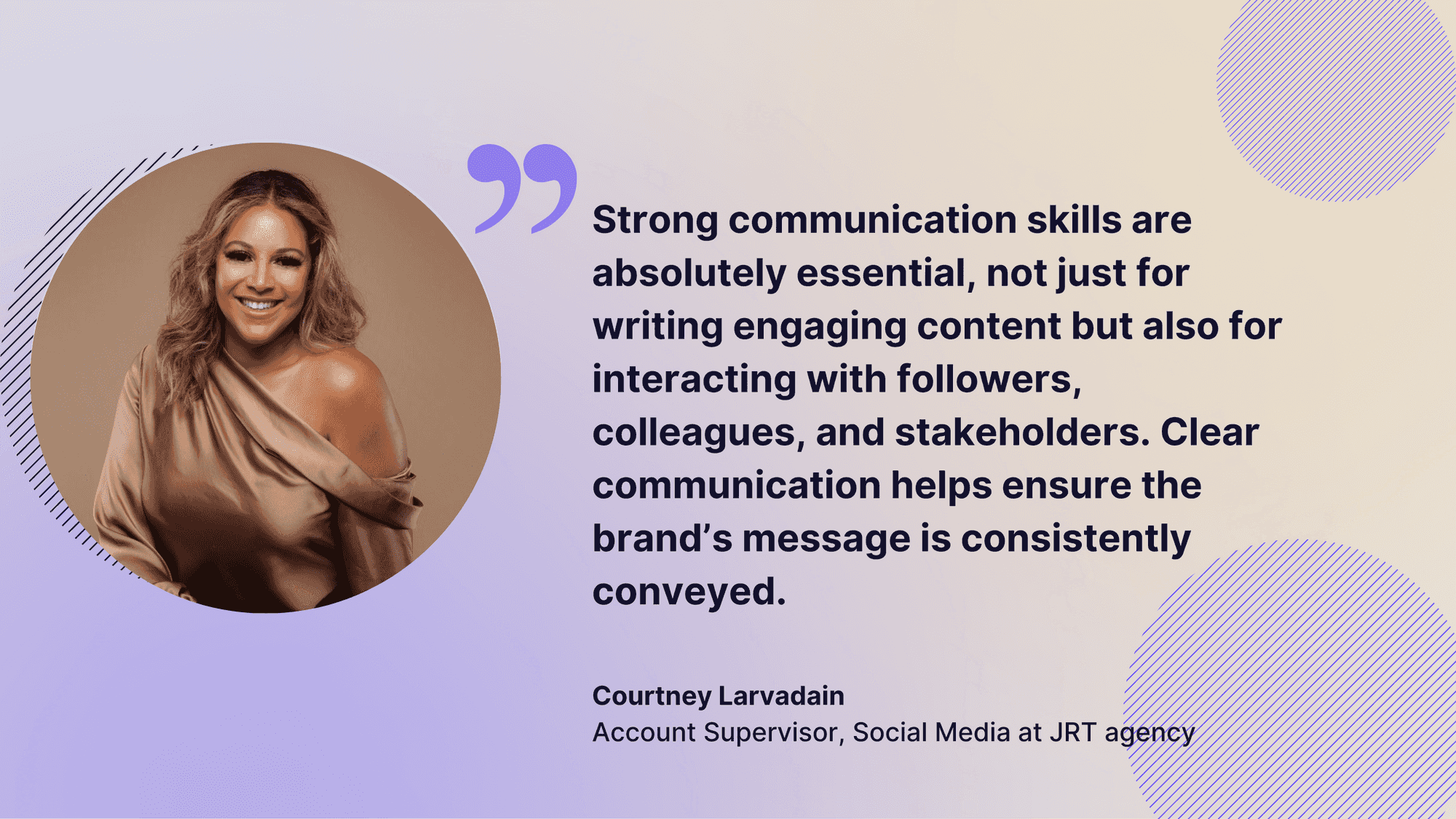
Strategic thinking
Working in a social media team, you quickly realize it’s far better to be proactive than reactive. To keep up the pace—and, more importantly, to stay ahead of your brand’s competitors—you need to have a strategic mindset, and the ability to plan five or even ten steps ahead.
This essentially means that no social media objective, post or interaction should be random, but rather based on solid market research, audience insights and past results.
Strategic thinking is essential in order to remember business objectives and adapt to changing circumstances, and not get carried away with making things look good and not ensuring ROI. - Summer Browne - Marketing Executive - Alphatec Engineering
Creativity
Inspiration might not always be easy to come by, but every social media team member should always strive to be creative – no matter their role. Creativity can be cultivated by following trending topics, experimenting with new formats, or exchanging ideas with team members.
Creativity is key. Developing original and engaging content that stands out in a crowded social media landscape requires a lot of creative thinking.
Alongside creativity, analytical skills are important too. Being able to analyze data and interpret metrics allows us to measure campaign success and make data-driven decisions to optimize our strategies. - Courtney (Lane Maki) Larvadain , Account Supervisor, Social Media the JRT agency
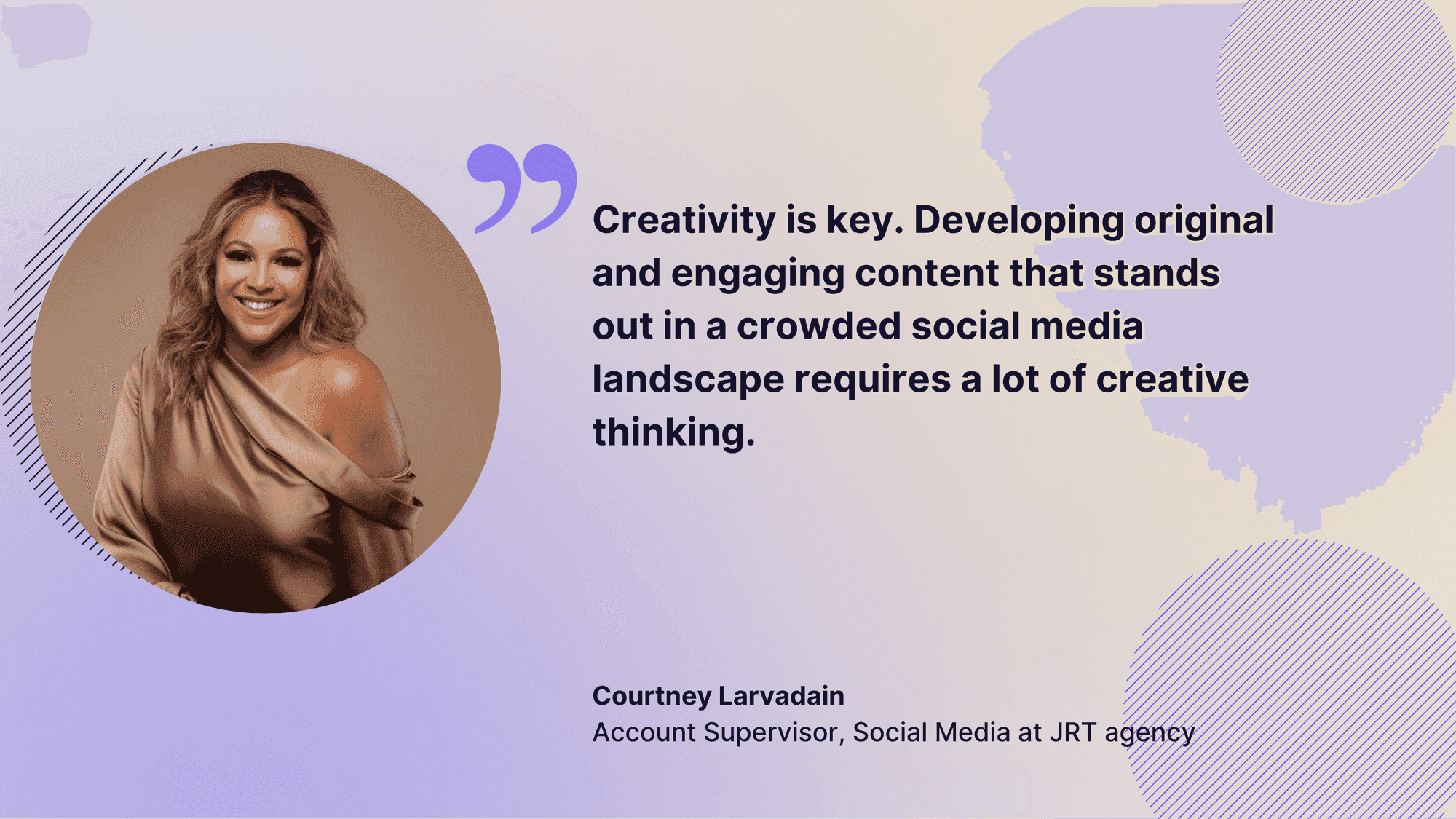
Naturally, much of this responsibility falls on the content creator, who needs to develop engaging content that resonates with the audience. However, everyone else can contribute by sharing ideas and providing feedback, ultimately creating a safe space where creativity can thrive.
Creativity is key for graphics, video editing, creating interesting post both visually and textually and problem solving.- Summer Browne, Marketing Executive, Alphatec Engineering

Adaptability
Adaptability is all about seizing every opportunity but also preparing for any potential challenges.
Anticipating changes in platform algorithms, audience behaviors, or even shifts in your industry dynamics gives you a competitive edge and enables you to adapt to any potential roadblock and refine your strategy.
Every member of the social team should be willing to learn constantly (e.g. adopting new strategies or tools), take criticism and strive to improve themselves. They should also be prepared to work against the clock and meet tight deadlines, particularly when timing is of the essence.
Team collaboration, written and verbal communication, creativity, ability to collect and interpret data, continuous learning, ability to take criticism, understanding of areas outside of social media such as marketing/branding/sales, knowledge of marketing principles, flexibility, ability to deal with stress and fast-paced content turnarounds are essential in a social media department. – Geisha Garcia - Director, Digital and Social Media at University of Miami
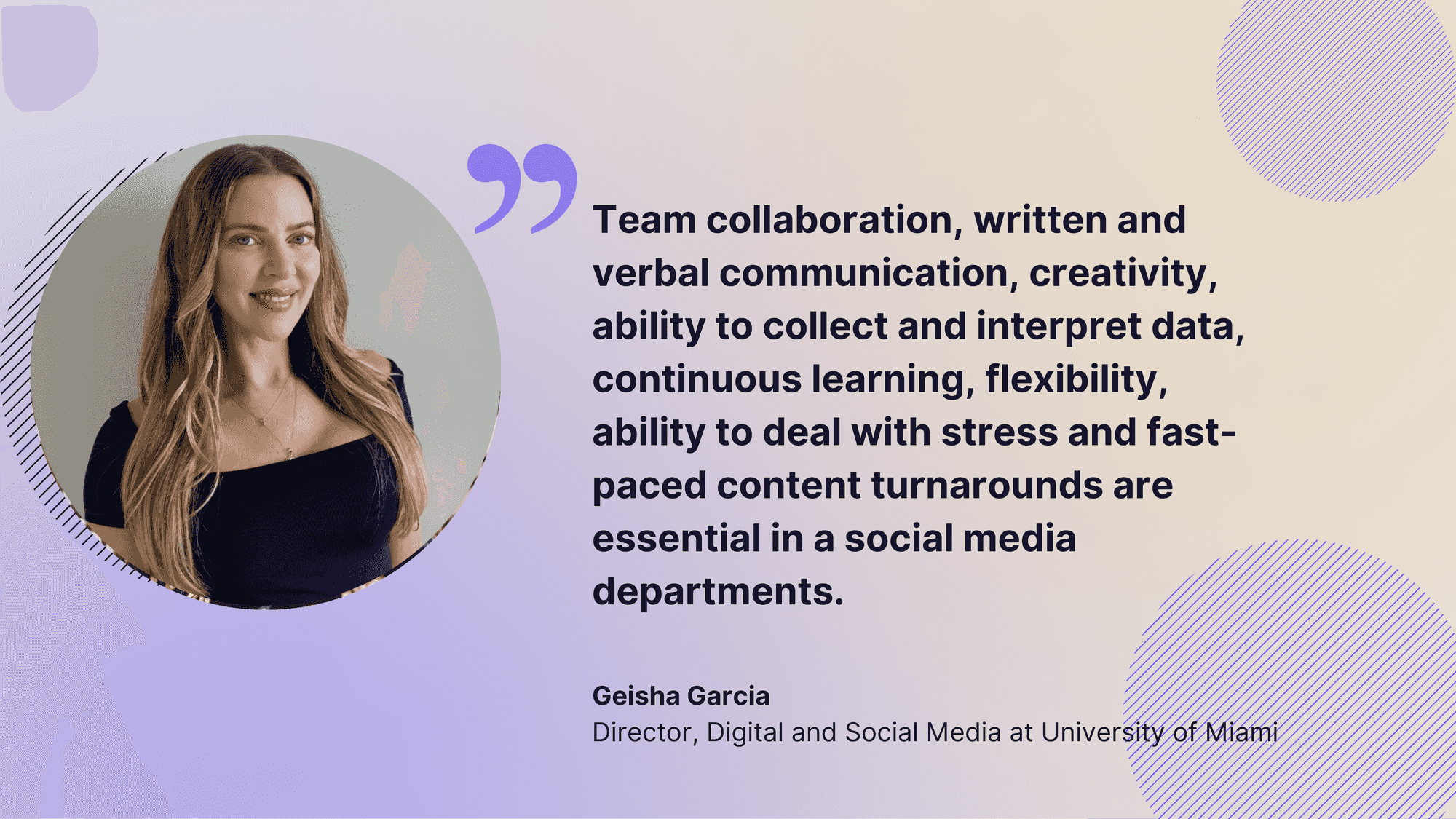
It’s about being flexible enough to pivot when needed, but confident enough in your long-team goals to keep going no matter what.
Flexibility and adaptability are crucial because the social media landscape is constantly evolving. Staying updated with the latest trends, platform updates, and best practices, and being ready to pivot strategies quickly, is a big part of the job.
Excellent time management skills are also important as managing multiple tasks, campaigns, and deadlines is a daily challenge. – Courtney (Lane Maki) Larvadain, Account Supervisor, Social Media the JRT agency.
Copywriting skills
In order to create content that not only gets people to notice your brand but also makes them care about it, strong copywriting skills are crucial. This applies not just to written posts but also to video content, where a copywriter can help craft engaging scripts, compelling video descriptions and on-screen text.
A great copywriter knows how to blend creativity with clear communication to create great content that doesn’t just inform the audience but also inspires action and builds brand loyalty.
Strong copywriting skills are essential. Social media managers need to write concise, engaging, and persuasive content that captures the brand’s voice and engages the audience. Whether it’s a witty tweet or a heartfelt Instagram post, words matter. – Vanjela (Nela) Bellovoda, Social Media Strategist
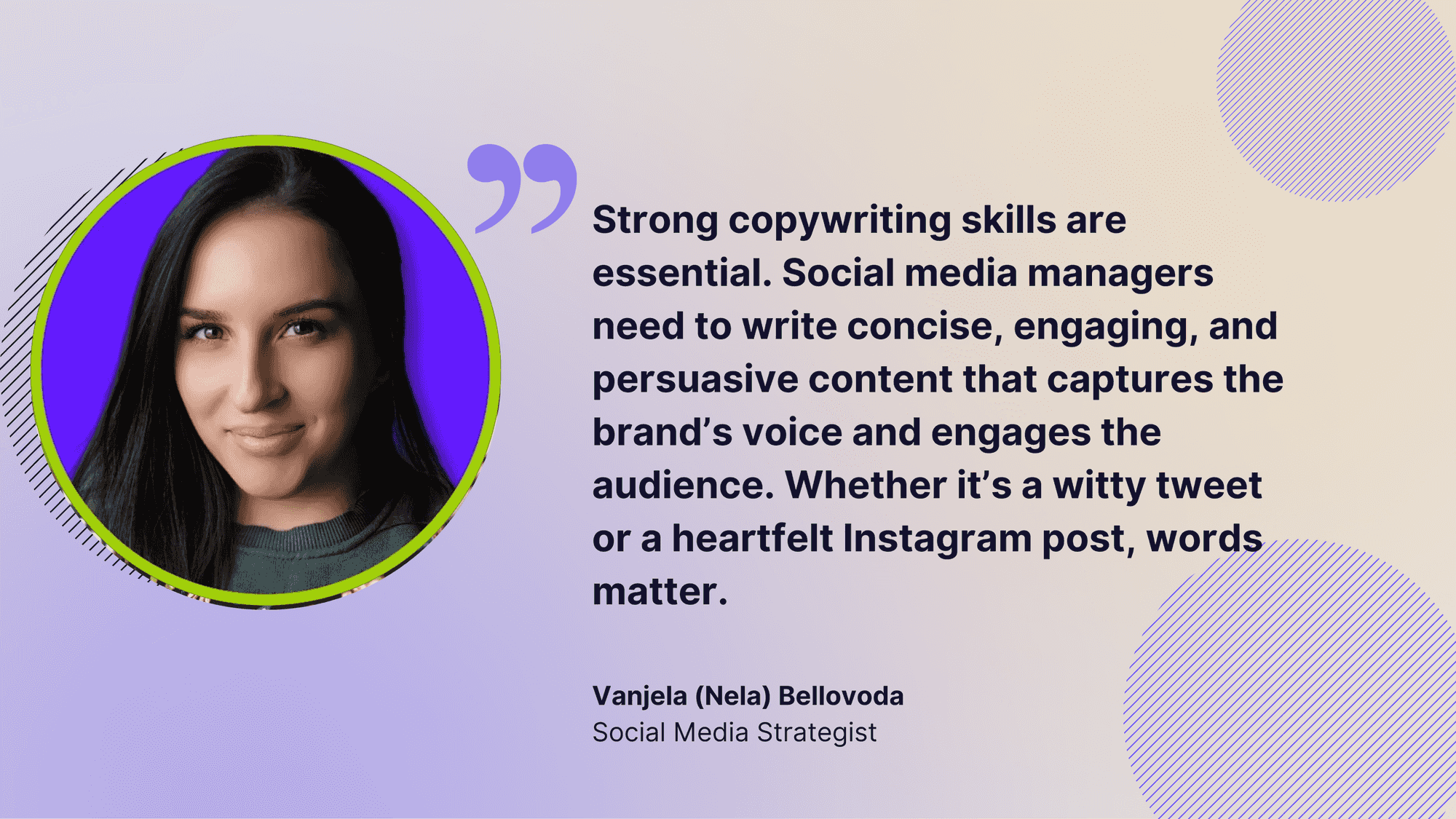
Project management skills
The larger the social media team, the more projects it can take on. However, without proper prioritization, things can quickly become chaotic. That’s why it's essential for every team to have at least one member who is highly skilled in project management. This person helps keep everything organized, make sure that tasks are clearly defined, deadlines are met, and team members are held accountable.
With the right project management strategy, a long, overwhelming list of tasks can be turned into a clear workflow.
Prioritization skills are essential for managing multiple projects efficiently, ensuring high-quality work and seizing opportunities within the digital ecosystem. – Alyssa Greve, Director of Social, Influencer and PR
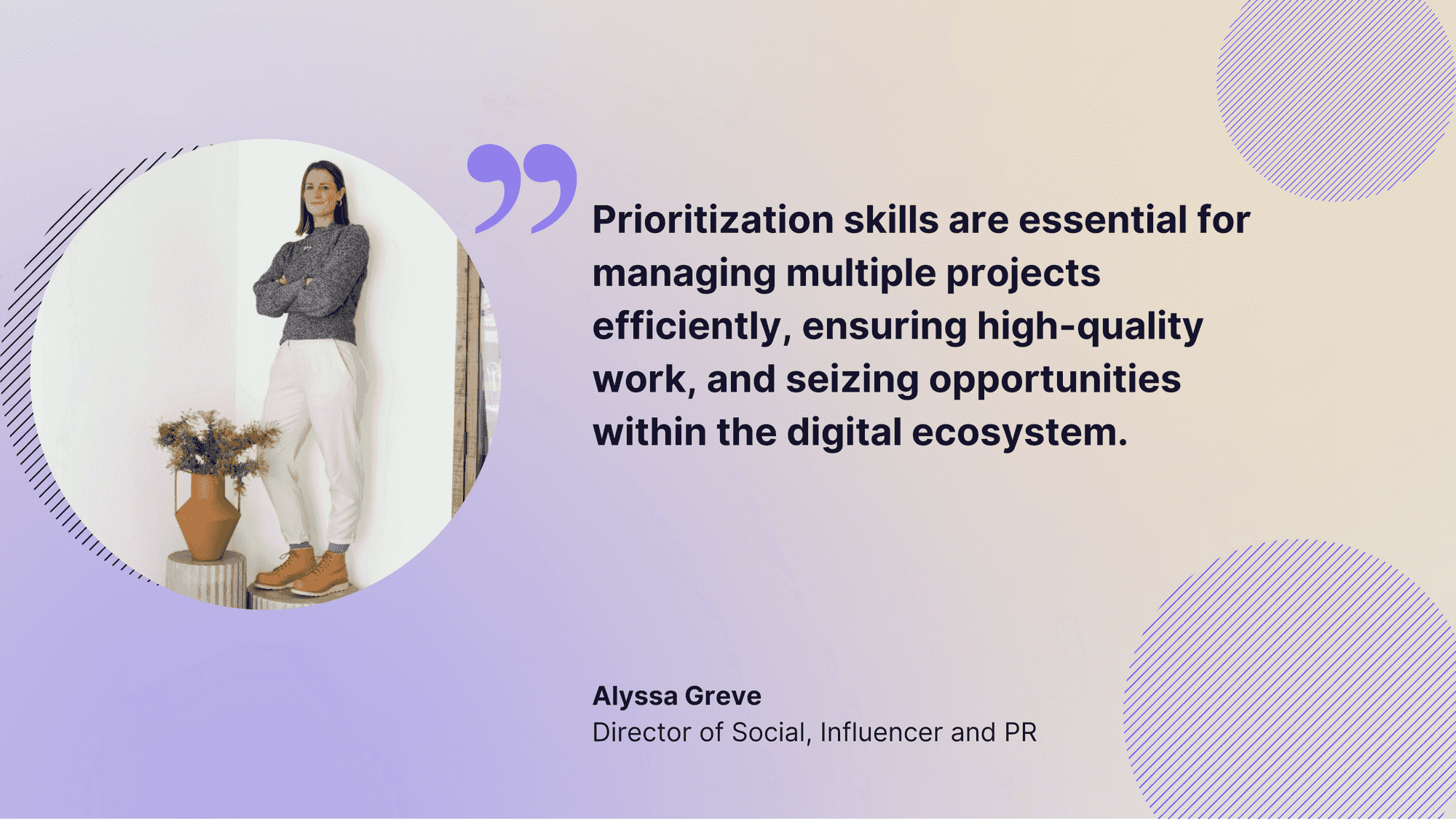
Design and video editing skills
Whether the social media team includes an in-house designer or video editor, or relies on an external collaborator – certain design and video editing knowledge is needed in order to create impact visual content.
By having an understanding of basic design principles and editing techniques, even non-designers can contribute to the creative process. They can create comprehensive briefs for the design / video production team, and they can provide feedback to make sure that the content aligns with the brand's overall identity.
The ability to translate complex ideas into accessible, concise, compelling creatives is very important in social media - Kate Meyers Emery, Social media scientist for nonprofits
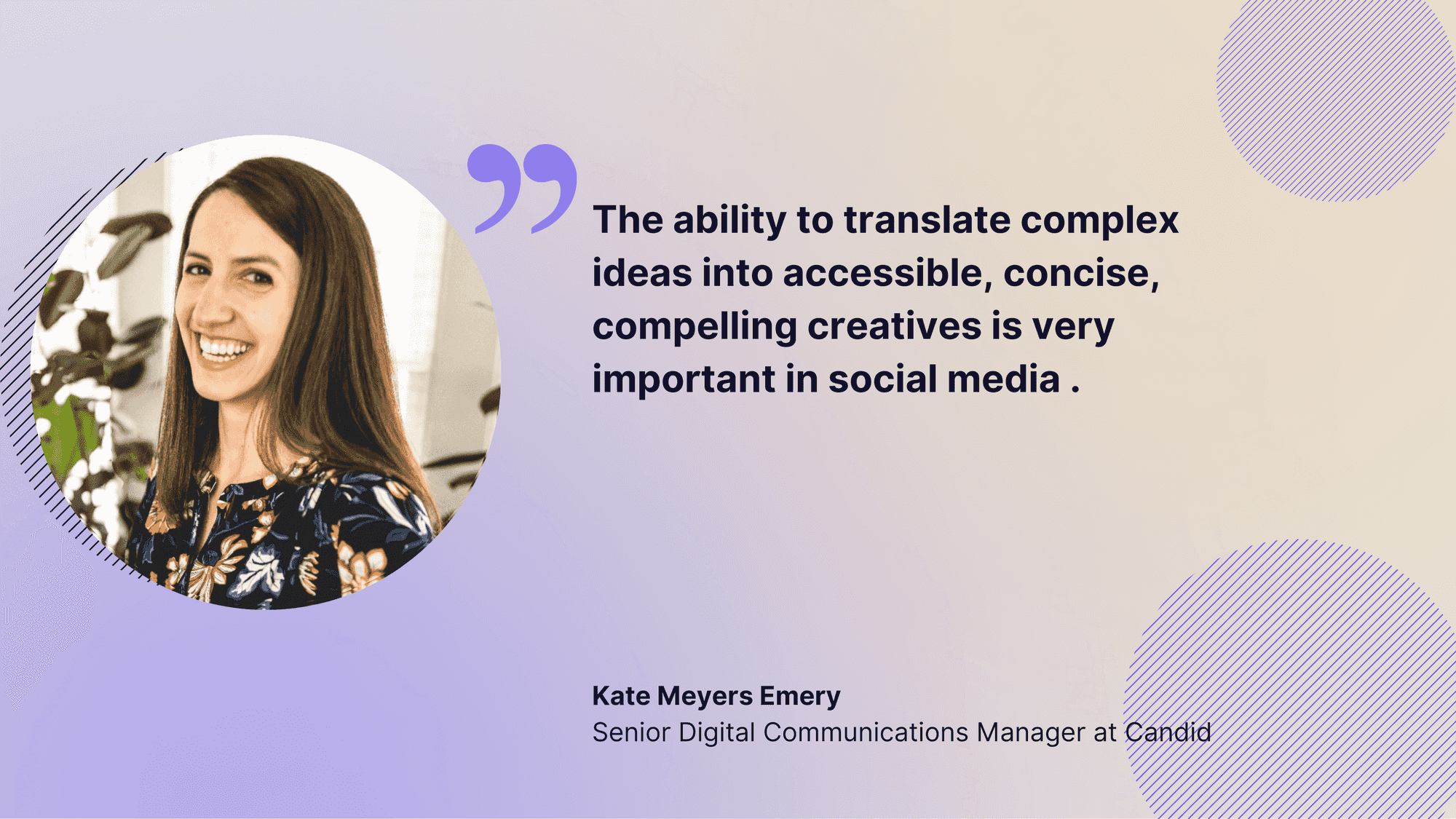
In-house vs externalized social media teams
When talking about social media, and social media managers in particular, a distinction has to be made between in-house and externalized teams (typically managed by agencies) that offer professional social media services.
So how do social media marketing agencies work compared to an in-house team, you may ask.
As per the usual digital marketing agency team structure, agency social media managers work as part of a larger team, collaborating with marketers, designers, and strategists. They use a set of standardized strategies which they tailor to meet the needs of every brand. They manage several content calendars and follow brand guidelines to the letter.
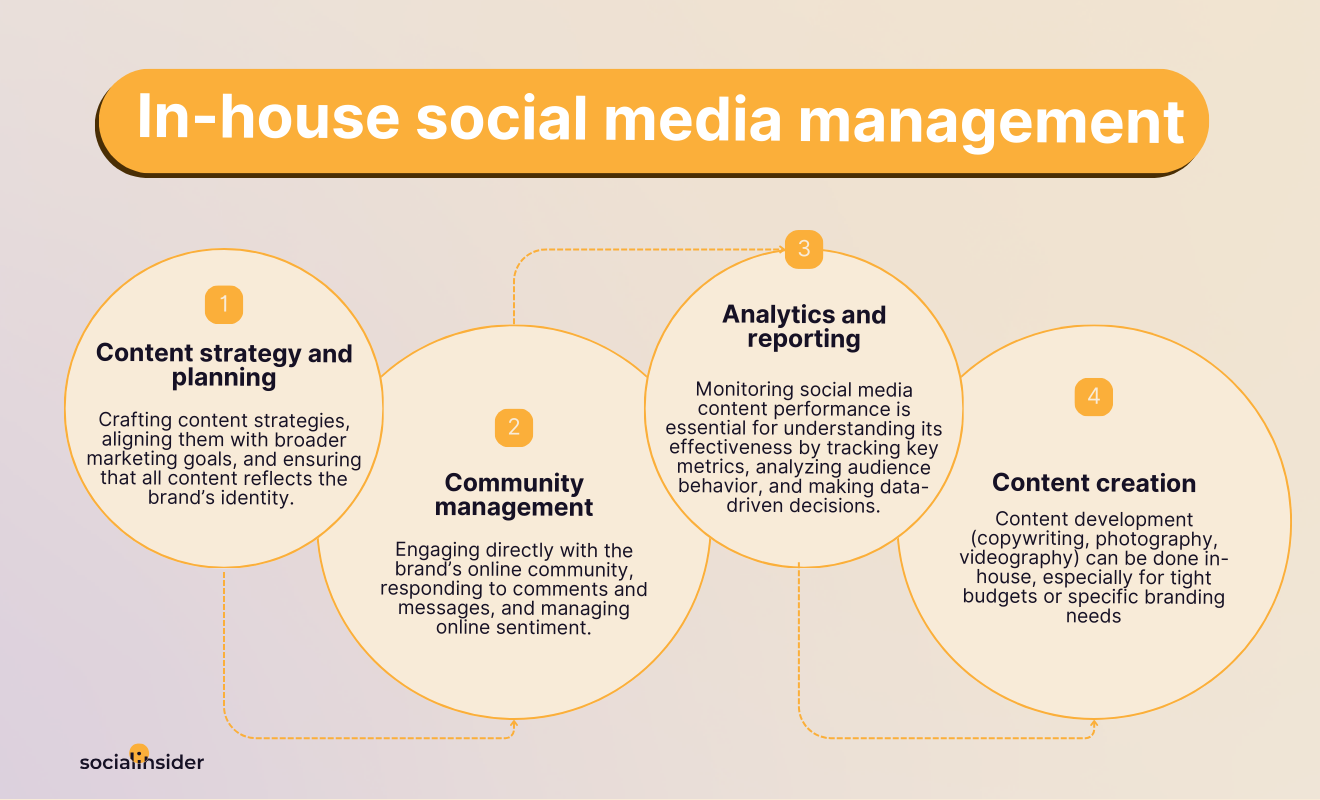
Community management tasks are often divided, with junior team members handling day-to-day interactions under their supervision.
In-house social media managers are, on the other hand, fully focused on a single brand, gaining deep insights into its identity, audience, and goals. They handle content creation themselves, making sure it feels authentic and stays true to the brand's voice. They build strong relationships with followers and manage customer interactions, ensuring a consistent and genuine presence across all channels.
When it comes to social media reports, agency managers provide detailed, data-driven reports using advanced tools and analytics.
By contrast, in-house managers focus on how social media performance plays into broader company objectives. They typically report directly to leadership, using insights to demonstrate social media ROI and inform future strategies.
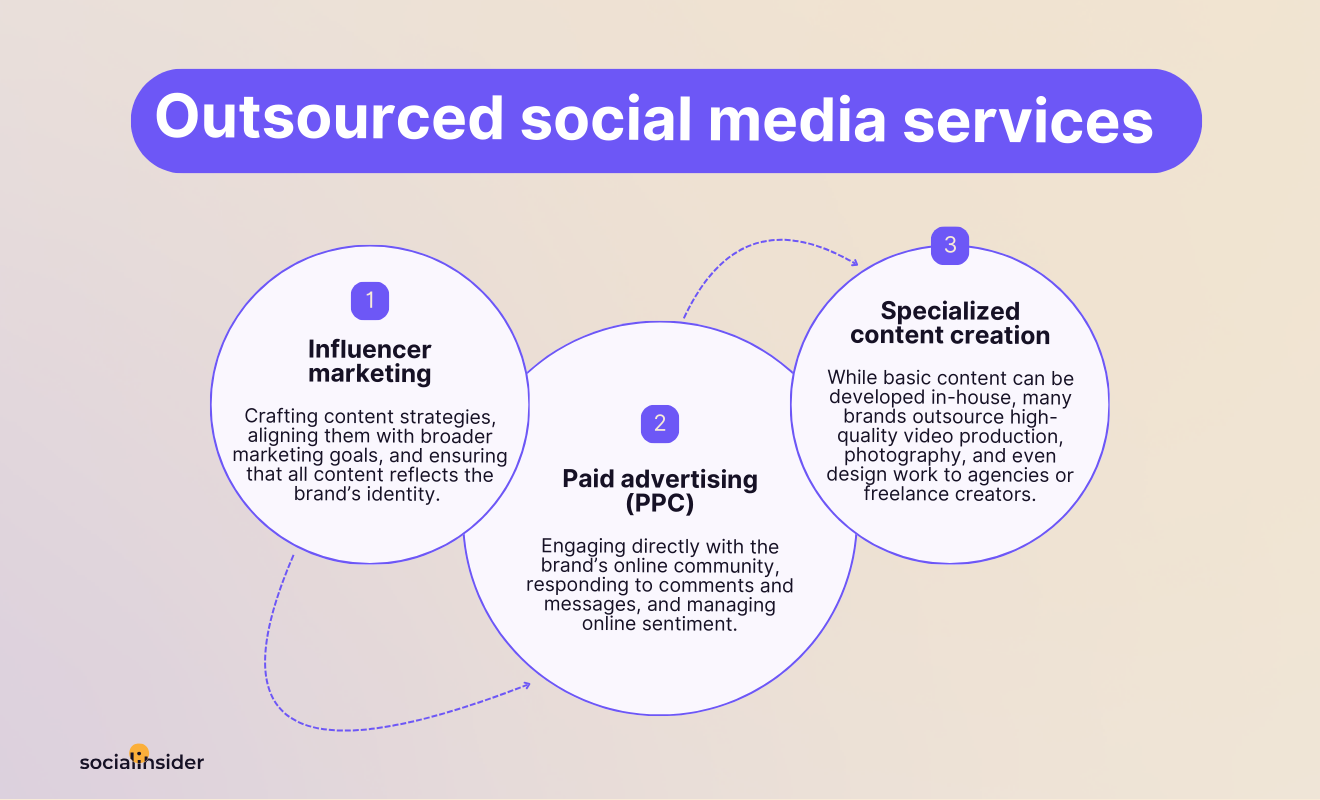
Tools for effective synergy within a social media team
In order to optimize their efforts, any social media team should take advantage of all the resources available to them, and that of course includes tools. The right tools can empower team members to communicate efficiently, store and exchange important files easily, manage their tasks, establish clear workflows and track their performance in real time.
Here are our suggestions for each category.
For team communication: Slack
Slack is ideal for quick, real-time messaging. With organized channels, direct messages and multiple app integrations, this tool can help the social media team stay connected and organized on a daily basis.
For file storage & sharing: Google Drive
It’s no surprise that Google Drive makes our list of top tools. This app is the go-choice for around 2 billion people when it comes to cloud storage, sharing, and file collaboration. Most importantly. Google Drive makes it easy for important documents to be easily accessible to all team members.
For task management: ClickUp
When it comes to managing multiple tasks and projects, ClickUp is a great solution. This tool empowers teams to keep track of projects, deadlines, and individual tasks. An added bonus lies in its customizable dashboards, which allow everyone to stay on the same page regarding priorities.
For content collaboration & scheduling: Buffer
Buffer allows teams to plan and schedule content across various platforms in advance, providing a visual overview of upcoming posts and enabling seamless collaboration.
For social media analytics & competitor research: Socialinsider
As a social media analytics and benchmarking tool, Socialinsider provides deep insights into performance metrics and competitor analysis, offering teams the means to track cross-channel data needed to refine their strategies and stay ahead of the competition.
By integrating these tools into their daily workflows, social media teams can become more efficient, boost their creativity, and focus on consistent content creation while tracking their performance effectively.
Final thoughts
Since their humble beginnings, social media teams have reached a point where they are essential for the long-term success of any brand, company, or business online.
With that in mind, it's important to understand how to build an effective team, what key skills to prioritize, what roles to map out and which tools are crucial for team synergy.
FAQs on social media teams
How to build a great social media team?
Building a great social media team can be challenging, but it ultimately comes down to prioritizing collaboration and growth opportunities. Hiring the right people for the roles is just the beginning – creating the proper environment that encourages development and learning is the key.
To this end, you could set up some training programmes that help your social media team members learn new skills, refine their existing ones, expand their networks, and apply their knowledge in practical ways.
Lastly, by encouraging collaboration between departments and sharing knowledge, you can prepare and indirectly teach the team to approach problems from different perspectives, making them more flexible and creative.
What obstacles do social media teams face the most?
Some of the main social media marketing challenges teams encounter are related to limited budgets, poor communication, content fatigue, lack of standardized procedures and frequent algorithm changes.








